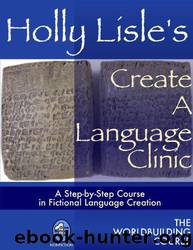Create a Language Clinic by Holly Lisle

Author:Holly Lisle [Lisle, Holly]
Language: eng
Format: epub
Published: 2011-03-11T08:00:00+00:00
■ they, them, their (plural, neutral)
• Interrogative
o who
o whose
o whom
o what
o which
• Demonstrative
o this (singular), these (plural)
o that (singular), those (plural)
• Indefinite
o all
o any
o anybody
o anyone
o anything
o both
o each
o each one
o each other
o either
o everybody
o everyone
o everything
o few
o many
o neither
o no one
o nobody
o none
o nothing
o one
o one another
o ones
o other
o others
o several
o some
o somebody
o someone
o something
• Relative
o that
o what
o whatever
o whatsoever
o which
o whichever
o whichsoever
o who, whose, whom
o whoever
o whomever
o whomsoever
o whosesoever
o whosoever
With all our many pronouns, English offers great flexibility (and a tremendous amount of opportunity for confusion).
But not a single pronoun is essential to the success of a language. English speakers could easily identify every noun by name each time speakers used the noun, and if doing so lent English speech and writing a certain wordy repetitiveness, the repetitiveness would kill neither speakers nor writers...nor even listeners.
The paragraph above uses no pronouns. Without pronouns, it was longer than it would have been without them. It was wordier. But it wasn't unreadable.
If you want to have pronouns, decide whether you want to be able to:
• determine singular, plural with them
• determine possessiveness
• identify male, female, neutral, or other genders with them
• have specific pronouns refer to classes, castes or other divisions within society
• have separate pronouns for humans, animals, plants, or inanimate objects
• use them for both questions and answers
• simplify your system so that one pronoun acts for all living things and one for all nonliving things; or have one for all persons (first, second, and third); or create only one pronoun that works in every situation, as a sort of universal it
Let's Do An Example
In the universe of The Ruby Key, I have a number of different classes of nightlings. Some of them tolerate each other fairly well, some not at all. They have different species origins, and though all are sentient (though not
necessarily smart), not all originated from humanoid or even animal life. There are a couple of nightling plants, and at least one nightling mineral.
I can toss a couple of proposals into the air, from which I can create pronouns and rules.
• The mammal-originated nightlings and the saurid-originated nightlings despise each other, and have specific pronouns that indicate that they are the superior form of life, and that the group they detest is an inferior form
• The animal-based nightlings, including the mammal and saurid forms, uniformly look down on the nightlings of plant and mineral origin
• Everyone detests the mineral-born nightlings
All nightlings in the region where the story takes place speak the same language. However, they aren't all going to speak it in the same way.
They'll have species-case pronouns. In order to keep myself from going crazy, they won't have the wild number of pronouns that English has. Their pronouns will be limited to first, second and third person, and to single and plural. No gender, no indefinite case, no demonstrative case, no possessive case. I'll deal with these language needs in other ways.
I will, however, have:
• Mammal case
o First person
■ hei (singular)
■ heiji (plural)
o Second
Download
This site does not store any files on its server. We only index and link to content provided by other sites. Please contact the content providers to delete copyright contents if any and email us, we'll remove relevant links or contents immediately.
Cecilia; Or, Memoirs of an Heiress — Volume 1 by Fanny Burney(32546)
Cecilia; Or, Memoirs of an Heiress — Volume 2 by Fanny Burney(31944)
Cecilia; Or, Memoirs of an Heiress — Volume 3 by Fanny Burney(31929)
The Lost Art of Listening by Michael P. Nichols(7494)
Asking the Right Questions: A Guide to Critical Thinking by M. Neil Browne & Stuart M. Keeley(5759)
We Need to Talk by Celeste Headlee(5608)
On Writing A Memoir of the Craft by Stephen King(4935)
Dialogue by Robert McKee(4389)
Pre-Suasion: A Revolutionary Way to Influence and Persuade by Robert Cialdini(4224)
I Have Something to Say: Mastering the Art of Public Speaking in an Age of Disconnection by John Bowe(3872)
Elements of Style 2017 by Richard De A'Morelli(3341)
The Book of Human Emotions by Tiffany Watt Smith(3300)
Fluent Forever: How to Learn Any Language Fast and Never Forget It by Gabriel Wyner(3077)
Name Book, The: Over 10,000 Names--Their Meanings, Origins, and Spiritual Significance by Astoria Dorothy(2978)
Why I Write by George Orwell(2945)
Good Humor, Bad Taste: A Sociology of the Joke by Kuipers Giselinde(2942)
The Art Of Deception by Kevin Mitnick(2796)
The Grammaring Guide to English Grammar with Exercises by Péter Simon(2740)
Ancient Worlds by Michael Scott(2682)
